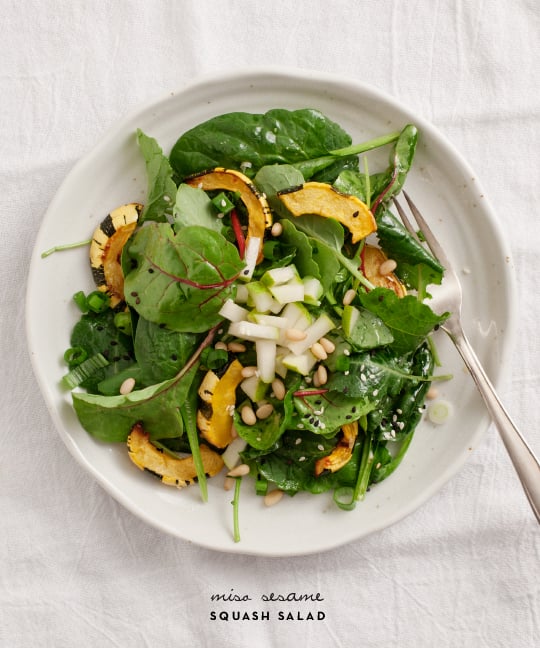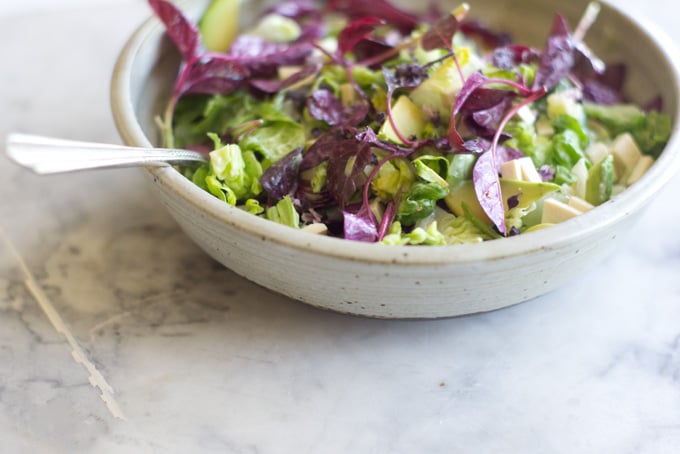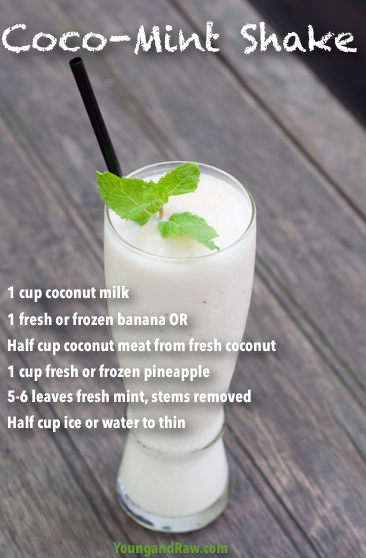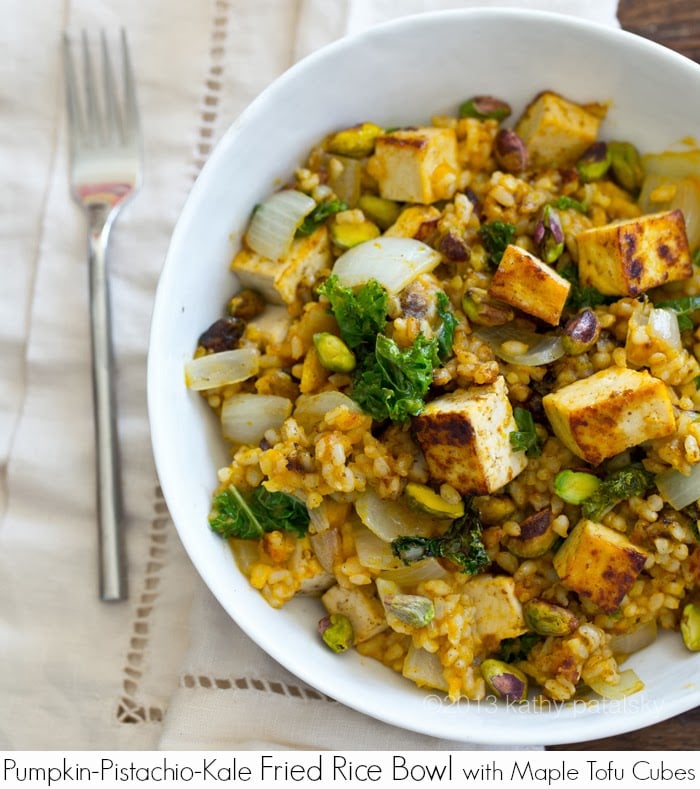Happy Sunday, all! I’m back from Melissa‘s wedding, where I had an absolute blast. I’ll have a recap tomorrow, as well as a new recipe for you, but for tonight, a late edition of “weekend reading”
1. Miso Sesame Squash Salad from Love and Lemons
2. Tofu Amaranth Salad from 101 Cookbooks (yay! another use for amaranth)
3. Coco Mint Shake from Young and Raw
4. Pumpkin Pistachio Kale Fried Rice Bowl with Maple Tofu Cubes from Healthy Happy Life
5. Apple Cinnamon Bars from Sweetly Raw (genius, Heathy!)
Reads
1. This review in the NYRB of a new book about jellyfish blooms. It came out a few weeks ago. Fascinating, frightening stuff.
2. Speaking of ecological and biological shifts in our contemporary world, I enjoyed this article about diversity–linguistic, cultural, and ecological. In the nutrition world, we often read about the advantages of a diverse, diet, or the problems associated with monocropping. This article looks at diversity more broadly, and addresses how the disappearance of dialects, plant species, food crops, and forms of life might pose significant risks to civilization and the planet.
3. This article about why it’s important to study cancer mutations. An interesting, broad-based look at why studying some of the small particularities of certain types of cancer is so important–and what the layman can take away from some of the more arcane dialogs about specific mutations. The article brought me back to genetics, which was probably my favorite post-bacc course. I did wonder if it would have been appropriate here to mention epigenetics, the study of how the genome responds to environment, though I realize that some of the mutations mentioned may not be susceptible to epigenetic factors.
4. This interview with vegetarian veteran Mollie Katzen. I’m a great fan of Mollie’s recipes. Early in my vegan journey, in 2007, my mom gave me a copy of The Vegetable Dishes I Can’t Live Without. The book had an impact on me because the recipes were so simple. Rather than aiming to recreate the taste or texture of animal foods, Katzen seemed to focus on the inherent beauty of vegetables, and she created dishes that allowed them to shine. Interestingly, this is exactly what she talks about in the interview above. While not exclusively vegan, Katzen’s food is always easy to veganize, and it’s very delicious.
5. This article about empathy and understanding for anorexics. Glosswitch, the author of the article, first mentions some of the recent efforts to study the genetic underpinnings of anorexia nervosa (which, incidentally, was the topic of a major post-bacc research paper I wrote, so it’s close to my heart). I believe that it’s important to study the genes associated with the disease, first and foremost to grant us better understanding, but also because this research can help to combat the misconception that disordered eating is a kind of excessive vanity.
At the same time, Glosswitch asks a vital question: “How far do we need to take anorexia from a social context and place it into a genetic one in order to make it ‘acceptable’? Does this represent progress or is it letting other forces off the hook?” She also asks a question I’ve wondered, too: how much does the origin of anorexia ultimately matter? Or rather, how much should we emphasize origins of the disease, rather than its impact? Glosswitch writes,
however anorexia sufferers make us feel, we must accept it is a horrible illness, regardless of what causes it. Anorexia sufferers deserve our care right now. It is difficult to set aside anger and revulsion when faced with behaviour that appears so nonsensical and hostile but however manipulative an anorexic may appear, that’s not what it’s like from the inside. Anorexia sufferers are consumed by hunger and their fear of hunger. It’s a miserable way to be. It shouldn’t matter whether the illness is culturally, socially or genetically motivated, or a mix of all three factors. Anorexia sufferers require our support.
I was moved by Glosswitch’s discussion of the ways in which it can be difficult to summon up empathy for a disease so confounding as anorexia. Her musings reminded me of a blog post I wrote for NEDA week this year, on finding compassion for those who are in the grips of disordered eating. In that post I mentioned that, in spite of the thirteen years I spent struggling myself, I still sometimes find it hard not to be frustrated when I encounter people who are deep in the grips of the disease. For a while, this frustration was a combination of concern and–if I’m being honest–envy. As grateful as I was to have recovered, I couldn’t help feeling a pang of longing for the sensation of safety and order my disorder had provided, and even for the shape I no longer possessed.
I no longer feel this envy, but I do still sometimes feel the frustration. In that NEDA post, I wrote about how the sight of someone who is still suffering deeply will make me want to scream, “Snap out of it! Choose life! You’ll be so much happier once you’re free of this!” Glosswitch is quite a bit more blunt, asking readers if they’ve ever wanted to say “For fuck’s sake, eat something. How hard can it be?” But in the end, she comes to the same realization that I have: it’s important for us–and by that I mean everyone, but especially people who have brushed paths with EDs, since we can use our history to be better advocates–to maintain limitless compassion. This doesn’t mean that we shouldn’t encourage recovery strongly, but it means that we have to remember what life on the “inside” of an eating disorder feels like. If you’re in it, the answer to “how hard can it be?” is “very, very hard. The hardest thing you could ask me to do. Help.”
And that, friends, is that. I wish you all a great evening.
xo
You might also like
This past week, I came across Luke O’Neil’s reflections on his struggle with exercise bulimia in Esquire. The article made me grateful that more is being written about (a) exercise bulimia (I linked to a CNN article in which my friend Abby shared her story a couple weeks ago) and (b) the need for a more gender-neutral discourse about eating disorders in our society. O’Neil sums it up well: “[A]s much as our generations-long assumptions about how men are supposed to behave and feel…
Happy Sunday, all! Thanks for your kind words about the new blog look. I’m delighted that you guys like it, and to those of you who were accustomed to the old look, and miss it, don’t worry: we’ll all adjust soon! There are still some small wrinkles being ironed out on the site, so if anything isn’t working, you can count on it being fixed soon (and if you notice that something’s still funky by the end of this week, holler and I’ll…
When we left off, I mentioned that my last night at the Dole Summit culminated in an Iron Chef cook’s challenge. What did this mean, exactly? It meant that we bloggers were divided into six teams, one for three courses of a meal: salad, entree, and dessert. For each of these courses, two teams were cooking off against each other for fifty minutes, using only the five ingredients in a mystery bag, and a number of condiments and foods laid out on a…
I’m hoping that my continuing streak of absentee/generally useless blogger behavior can be offset somewhat by the fact that the five recipes in tonight’s weekend reading happen to look particularly great. All of them have been pinned and put onto my “must make” list–whenever, that is, I get my culinary creativity back. This week featured a fairly monotonous parade of packed lunches and simple dinners, interrupted by a short lived but nasty cold that is thankfully retreating. But I can feast with my…







Leave a Comment
Gena, you made my week with that article on ecological and linguistic diversity. I wrote a long-winded journal entry about that a few years ago after visiting Norfolk Island, where they speak an endangered language. As someone who studies biodiversity, I was really interested in the parallels between biodiversity and linguistic diversity, and if/how the latter makes societies more robust. One of my good friends is a linguist, so I had a bit of a chat with her about it, but I’d really love to do an interdisciplinary research project on this topic one day. So much to think about!
What you wrote about eating disorders is so true Gena. In fact, I can’t tell you how many times in the earlier days of my recovery, just how much I wanted to scream back at people, ” I can’t! I can’t! I can’t” In fact, I often sat in my floor, crying for hours before eating a meal that I didn’t prepare. It sounds so foolish now, but my disorder had a hold on me greater than anything else ever had. I didn’t even know how far I had gone off the path of life into a path of disordered eating until I was forced to eat other foods. That fear is one I had never experienced before, and it terrified me that something had ahold of me. People who say ED are just about food have no idea what its like. Yet now, as a blogger who has recovered, I meet girls that were in the same shoes I was, and often find myself thinking, ” Why can’t they just do it?” Then, I realize, and I remember, and I just want to cry for them and with them. Great post and thanks for reminding all of us to show more compassion.
Those last two articles cited look especially intriguing to me. Funnily enough, I was enthralled with Mollie Katzen’s earliest vegetarian cookbooks – the first volume of the Moosewood Collective (circa 1970 something!) as a teenager, followed by her adorably illustrated Enchanted Broccoli Forest cookbook…oh, how I idolized her as a preteen looking for a “food identity.” And, of course the last article you reference is relatable for all the reasons you mention here and those we’ve discussed in past dialogs.
I am loving these weekend reading posts!!! You always find such great information to share and get me thinking in new ways.
I really appreciate the New Statesman article and your thoughts on it. One thing that is so often overlooked is that for those struggling with anorexia, it’s not only about recognizing that this way of living is not healthy and not making our lives any better as a means to recovery. Just because we know we are acting “crazy” about food doesn’t automatically give us the ability to recover – which is why it is indeed a mental illness. And the longer one struggles with the disease and the longer body is deprived of adequate nutrition the more physiological changes occur that then lead to more distorted thinking and even greater emotional sturggles and also greater physical discomfort in eating. The body shutting down physically is not a pleasant experience and not without important ramifications. It’s a viscious cycle. However, in my experience physcians are all too quick to write this off as a choice and therefore negate the affects of the physical complications as somehow also all “in our heads” and that we can magically make them disappear as well. As soon as it comes out that we have an eating disorder, no one wants to consider the physical side of the disorder that is only making the psychological aspect even more challenging to overcome. And as much as we realize that this is no way to live, we still have a hard time finding the way out.
I do still find it tough seeing people clearly in the depths of an eating disorder and I’m sure part of that, along with frustration with what the illness is taking away from them, is that bit of envy. I suppose this will fade with time and with that perhaps I could be more help to those suffering as I will be able to engage with them with compassion and understanding.
I’ll head over and check out the NS article now. Love your recipe picks too! I’ve bookmarked Kathy’s pumpkin, kale, tofu, rice bowl 🙂
And I totally identify with what you said here – “As grateful as I was to have recovered, I couldn’t help feeling a pang of longing for the sensation of safety and order my disorder had provided, and even for the shape I no longer possession.”
This is why I personally feel that those who have personally dealt with an eating disorder are far more effective at helping those who are suffering, because it is such a difficult thing to understand. In my own experience, the symptoms of an eating disorder are just that, symptoms. Most of the time the “vanity” aspect of it is just a surface issue. I feel that one needs to be in huge emotional pain to be able to override the biological drive to eat. I do not feel that vanity is ever motivation enough.
We must remember too that those who are suffering are really in an altered state of being. So many biological/emotional factors are playing into their behaviours. My mom actually saw my ED as a separate entity, something that was not me but was dictating my behaviour, I understand this thinking because my way of being was so out of character.
I feel like in most cases, it really has nothing to do with the food. These people are suffering on a deep level, and their disease is a manifestation of not being able to reach out for help. I know I did not understand my own pain and reasons for delving into my disease until years later.
As with anything, I feel that what all people need is compassion. We can never assume we understand what someone is going through, and we must always assume that each individual is doing the best they can with what they have got. What those who are suffering need are new tools for dealing with what is bothering them. And often time a compassionate ear is the very thing that helps to cut through the facade of “vanity” to the deeper issues. It is when an individual feels safe and not judged that they can look inside.
Awesome post! Glad you liked my smoothie recipe 😉 <3
This is such a great thing. I love how you’re introducing me to all these new people and ideas. Thanks!
You find the greatest articles and recipes. I need your blogroll so I can follow everyone you follow! (Those apple cinnamon bars from Sweetly Raw look amazing.)
By the way, the interview you gave me is up on my blog today. Thanks again, Gena. You’re the greatest!